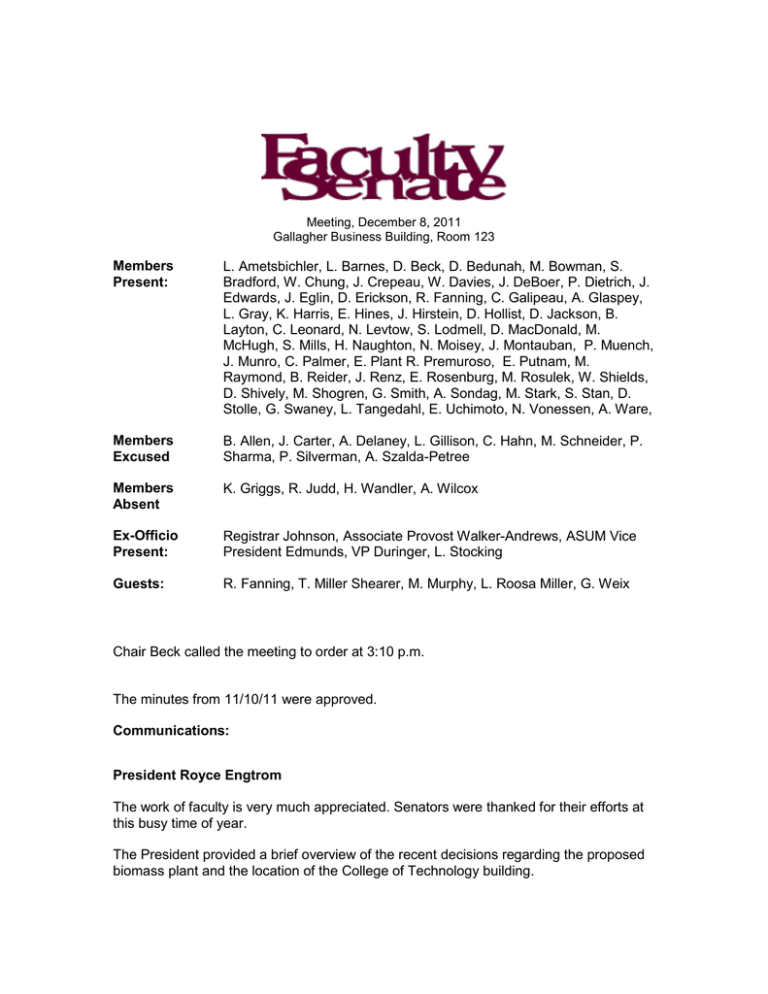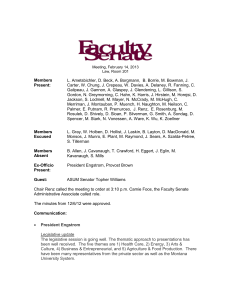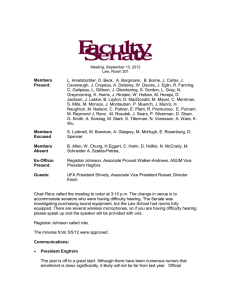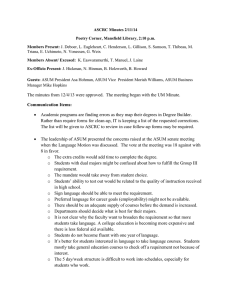Members Present: L. Ametsbichler, L. Barnes, D. Beck, D. Bedunah, M. Bowman,... Bradford, W. Chung, J. Crepeau, W. Davies, J. DeBoer, P....
advertisement

Meeting, December 8, 2011 Gallagher Business Building, Room 123 Members Present: L. Ametsbichler, L. Barnes, D. Beck, D. Bedunah, M. Bowman, S. Bradford, W. Chung, J. Crepeau, W. Davies, J. DeBoer, P. Dietrich, J. Edwards, J. Eglin, D. Erickson, R. Fanning, C. Galipeau, A. Glaspey, L. Gray, K. Harris, E. Hines, J. Hirstein, D. Hollist, D. Jackson, B. Layton, C. Leonard, N. Levtow, S. Lodmell, D. MacDonald, M. McHugh, S. Mills, H. Naughton, N. Moisey, J. Montauban, P. Muench, J. Munro, C. Palmer, E. Plant R. Premuroso, E. Putnam, M. Raymond, B. Reider, J. Renz, E. Rosenburg, M. Rosulek, W. Shields, D. Shively, M. Shogren, G. Smith, A. Sondag, M. Stark, S. Stan, D. Stolle, G. Swaney, L. Tangedahl, E. Uchimoto, N. Vonessen, A. Ware, Members Excused B. Allen, J. Carter, A. Delaney, L. Gillison, C. Hahn, M. Schneider, P. Sharma, P. Silverman, A. Szalda-Petree Members Absent K. Griggs, R. Judd, H. Wandler, A. Wilcox Ex-Officio Present: Registrar Johnson, Associate Provost Walker-Andrews, ASUM Vice President Edmunds, VP Duringer, L. Stocking Guests: R. Fanning, T. Miller Shearer, M. Murphy, L. Roosa Miller, G. Weix Chair Beck called the meeting to order at 3:10 p.m. The minutes from 11/10/11 were approved. Communications: President Royce Engtrom The work of faculty is very much appreciated. Senators were thanked for their efforts at this busy time of year. The President provided a brief overview of the recent decisions regarding the proposed biomass plant and the location of the College of Technology building. After President Denison signed the commitment to climate change with the goal of carbon neutrality the administration started to investigate an alternative method of heating the University that would use less fossil fuel. Carbon from biomass recirculates throughout the biosphere where carbon from fossil fuel does not. When first considered the projected cost differential between natural gas and biomass was fairly large. The projected savings was going to be used to finance the building and instillation of the biomass plant. Last year the price of natural gas dropped precipitately and the University was unable to find a low cost reliable source of biomass fuel. Thus, financing the project is untenable in the foreseeable future. Although the air quality parameters are projected to be within legal limits, air quality became an issue. Particulate matter would increase over natural gas. This caused considerable angst with many Missoula citizens. The dialog became emotional and was no longer based on objective reasoning. There would have to be some significant changes in the biomass technology and availability of fuel to make a biomass plant feasible in the future. The University is still committed to moving toward carbon neutrality and the discussion regarding how this can be done needs to be intensified. Administration and Finance may be contacted for more detailed information. The South Campus Master Plan was developed with input from campus and the community and approved by the Board of Regents in 2007. (http://www.umt.edu/adminfin/campusmasterplans/SouthCampus.pdf) The plan provides a guide for future development. Because the University has a new President and the need for a new College of Technology Building has become more public, individuals not pleased with developing the Golf Course pressed for a different plan. President Engstrom studied the issue to determine whether there was an alternative. The plan encompasses the next century of growth for the University. The decision was about prioritizing the physical development of the campus (next generation of students) over the recreational usage of the golf course (next generation of golfers). The South Campus College of Technology building will not close the golf course. It will, however, be necessary to reroute some of the holes to maintain a viable nine hole golf course with some par 4s. The golfing community will be invited to provide input regarding the rerouting. Perry Brown, Provost The marketing firm, Mind over Matter (MOM) has been hired to coordinate the branding and marketing project. It will solicit input through online questionnaires, focus groups, open houses, and other means. It is important that faculty are engaged in the discussion, so please respond to communications from MOM. There is also a branding exercise taking place for two-year education by the Montana University System. There is a planning meeting in Bozeman next week. Nation-wide approximately 53% of all students in higher education are in two-year programs. In the state of Montana it is only 27%. Therefore, the perception is that Montana’s two-year programs are underutilized. The State is looking at ways to get more students involved in higher education. It received a Lumina grant to develop innovative, cost-saving strategies for delivering high-quality education to greater number of students. One issue that will need to be addressed is the alignment of the name (College of Technology) with the two-year mission. It must be clear that the two-year colleges are a pathway to the four-year institutions. Future jobs will require some-level of higher education. Senator Uchimoto: What is the earning potential of AA degrees compared to high school and college graduates? President Engstrom: Nationally a bachelor degree earns a million dollars more over a life time than a high school diploma. An associate degree earns $3-400,000 more. These numbers are not quite as high in Montana. The link to the complete study will be sent to senators (http://www9.georgetown.edu/grad/gppi/hpi/cew/pdfs/collegepayoff-complete.pdf). Senator Uchimoto: Would it be possible for students to earn an AA degree in the process of a bachelor degree, similar to a master degree while earning a PhD? Provost Brown: The administration is discussing the possibility. Students and employers are quite interested in credentials. Such a system would provide re-entry students with a platform of completion as a starting point. Associate Provost Walker- Andrews – Global Leadership Initiative Members from the Global Leadership Initiative Committee (Daisy Rooks- Sociology, Ray Fanning – Journalism, Charles Janson- DBS, Michael Murphy- Media Arts, Charles Palmer- HHP, Liz Roosa Millar- University Center, and Tobin Miller Shearer- History) were in attendance to answer questions. The Global Leadership Initiative is in part a response to the strategic plan, but also aligns with the accreditation core themes (partnering for student success, education for a global century, and a dynamic learning involvement). It is aimed at getting students excited about their education and preparing them for a changing world. Examples of global concerns include economic viability, population and environmental change, effects of technological advances, ethical dilemmas, generation and distribution of wealth and resources. We hope our students will contribute towards innovation, new technologies, and civic and cultural engagement. The first year students will be enrolled in small seminars (maximum of 20 students). Ten seminars that fulfill a general education group will be offered this spring, but will normally begin in the fall. JOUR 191H The Net Effect GEO 191N, The Power of Numbers BIOB 191N Human Genetics, Your Family, and Global Health Care BADM 191 Doing the Right Thing: A Global Strategy for Good Business PSCI 191 X Issues in Global Public Health MCLG 191L Human Rights Issues in Contemporary Latin America JOUR 110Y News Literacy: Truth v. Truthiness MUSI 191L Music, Meaning and Manipulation SOCI 191S Food and Society in a Globalized World BIOB 191N Global Climate Change: Science, Society, and Ethics The students will also be required to attend two presidential lectures in both the fall and spring semester. Faculty have volunteered to offer discussion groups following the lectures. In the sophomore year students will have a model leadership experience. The experience could be a weekend retreat with a role model like Hilary Clinton or a day with successful mentors such as the Achievement of the Mind event. Every eligible student in the program will receive a passport at the end of their sophomore year. General Education courses may be linked to the big question they are studying. In the Junior year students will participate in a hands on experience (service learning, study abroad, internship, or research). The President has been fund raising to provide resources for these experiences. Students will need to apply for financial assistance if needed. The senior year, students will attend a capstone fair to discuss their ideas; then the students must participate in a collaborative project that looks at a solution to a big question. At the end of the program students will receive a certificate of completion. This is not an official certificate that requires Board of Regents approval, but rather an acknowledgement of participation in the pilot program. The intention was for the cohort to be representative of the student population of the University of Montana. Two hundred randomly selected students were invited to participate. Not all agreed to participate. So the number will likely be between 150 and 200 after spring registration. The 2011 Cohort is made up of 36 majors with 23% undecided. There are 62% female students and 38% male students. More out-of state students agreed to participate so the percentage of in-state and out-of-state students is 50%. The three-year pilot will bring in a cohort of approximately 200 students each year. The University is committee to move the cohorts through the program. Faculty should start thinking about offering freshman seminars, advising and mentoring particularly when students are pursuing their research interests in the third year. It would be nice if faculty would encourage students to participate, so it is important that they understand the requirements of the program. Students should be directed to Jean Loftus if they need help. The broader vision of the Global Leadership Initiative is to be transformative and to apply to all undergraduate students in the future. It is designed for students to choose their course work based on interest in a big or enduring question and to work collaboratively. The general education requirements have not changed. However, faculty are encouraged to link courses for students to have interdisciplinary experiences. Seminars will be on the normal review cycle next academic year and will be subject to the full faculty governance review process. Departments may also review the seminars to determine whether the courses may be appropriate for major credit. The focus on global leadership emphasizes the need for language, but no changes have been made to the requirements. Senator Eglin: What happens to the students whose interests don’t have immediately evident practical applications, such as students who want to study medieval history, or classical philology? Some students may be interested in a humanities course about what it means to be human. No discipline area will be left out intentionally. It is up to faculty to propose seminars related to big and enduring questions. At this point the seminar proposals are limited to tenure and tenure track faculty. Faculty are welcome to team up with visiting faculty or have guest lectures. The following criteria are used to select the seminars: Understanding of critical global issue Multidisciplinary approaches Integration of knowledge Citizenship in the global society Activities that engage students, such as research and service-learning Course goals Learning outcomes Diverse perspectives Senator Uchimoto: Full implementation of the initiative may require the revision of the current general education structure. This may not be a bad idea. He currently serves on the General Education Committee. Some of the criteria can be difficult to apply. It seems the structure could be streamlined. He encourages the Faculty Senate to revisit the general education structure. Senator Shively: How will the Global Leadership Initiative articulate with the proposed International Global Studies Major? This major should provide students with a place where they can explore their interests. It should provide the type of course work and opportunities necessary to be meet the goals of the pilot program. Will there be opportunities for transfer students or students not invited as freshmen (that may become interested as sophomores) to participate in the program? The committee will need to develop some flexibility for this sort of student interest. This may create difficulties in terms of the pilot projects representative goal. It is desirable to have student participants excited about the program, but we need to be careful not to only have participation from honors students or out-of-state students. Senator Sondag: This will become a resource issue as more faculty offer seminars and adjuncts are hired to teach the course they currently teach. How long can we continue to grow the program? It is important to discuss these issues during the pilot phase. The institution will need to think about what majors require of students, and whether flexibility is possible. Professor Weix: Will the GLI Steering Committee that is currently reviewing the proposals eventually be folded into faculty governance? Departments still decide what they are going to teach. Any GLI course that is proposed to become permanent will require review by ASCRC and the General Education status will be reviewed by the General Education Committee as well. If you have further questions please contact the committee or Associate Provost WalkerAndrews. ASUM Vice President Edmunds Chair Beck was thanked for attending the ASUM senate meeting. ASUM is excited to partner with Faculty Senate to achieve mutually beneficial goals, such as the continuation of crosslisting. ASUM approved a resolution endorsing the continuation of crosslisting. ASUM will be joining the leaders of the Faculty and Staff Senate at the University Council meeting December 13th to discuss shared governance. ASUM had a moderated strategic planning retreat in November where a condensed mission statement, core values and areas to strengthen were discussed. The new mission statement is: The Associated Students of The University of Montana serves students by advocating, empowering and providing responsible representation. ASUM granted budget authority of $60,000 to renovate the ASUM offices to be more identifiable and welcoming. ASUM would love to hear your ideas about how to better serve students or partner with faculty. Chair’s Report: Campus Governance meetings The Faculty Senate leadership has been meeting monthly with the leadership from ASUM and Staff Senate to discuss current issues and ways of working together. One outcome of this is a committee to improve communication about committees and student involvement. In addition, ASUM passed a resolution in support of crosslisting. UFA Bargaining Update In November the Union requested and the administration agreed to a non-binding mediation to deal with 1) inversions and compressions and 2) shared governance. The Commissioner’s Office responded that the earliest they could meet was late January. Please contact the Union if you have questions or have not received the update. Communicative Sciences and Disorders – Senator Sondag In 2008 the program was resurrected after a 20 year absence. It consists of three components – Bachelor of Arts degree, Master in Science degree, and a leveling program that identifies courses required for students to be accepted into the master’s program that currently have a BA. The program has gained the maximum five-year candidacy accreditation status from the Council on Academic Accreditation in Audiology and Speech Language Pathology. It has enrolled a greater number of undergraduate and graduate students than anticipated. And met projected graduation rates. Last May the first cohort of graduate students (21) graduated. All students passed the Praxis Series Exam. All 21 students are employed, 17 of them in Montana. Committee Reports ASCRC Chair Tangedahl Curriculum consent agenda ASCRC Chair Tangedahl briefly summarized the curriculum review process. There were approximately 300 curriculum forms considered by 9 subcommittees. The subcommittee chairs follow-up with revisions and bring the items to ASCRC for consideration. In most cases ASCRC takes the recommendations of the subcommittee. One level one proposal – Minor in Forensic Studies approved last month has been withdrawn. ASCRC discovered that some of the departments with elective courses in the proposal had not been notified. The proposal will be resubmitted next year after proper consultation and approval. There is an additional level I proposal – Police Science AA that has a separate consent agenda. There are two level II proposals, 23 program modifications, 9 general education courses, 7 writing courses, and 34 service learning courses (11 new designations). All service learning courses were reviewed this year to assure compliance with the criteria. The Mansfield Center defense critical language courses generated lots of discussion. The courses are offered to military personnel. ASCRC also discussed compressed courses. ASCRC continues to be troubled with a trend in courses offered on shorter time periods. This was reflected further in the upcoming condensed winter session schedule. It is shorter than the usual time period because of two holidays. A couple of corrections were noted on the consent agenda – CSD was under the wrong college and GPHY 421 UG was previously approved in November. The consent agenda was approved. The AA (60 credits) in Police Science includes courses (18 credits) that are taught by the Police Academy in Helena. It has been considered in great detail by the subcommittee and ASCRC. Senator Muench: The proposed course of study requires 63 credits. Lynn Stocking, Associate Dean, College of Technology: The minimum for an AA degree is 60 credits. The College of Technology worked with Sociology to fine tune the required courses and will need to update the form. Chair-Elect Renz: Email communications were sent prior to the meeting. Professor Renz is in favor of a Police Science AA degree and is support of the concept of collaborating with MLEA, but recommends that some improvements be made to the proposal before it is approved. His concerns include: • • • • • 18/63 credits from non-accredited institution. 18/63 credits from non-UM faculty. (What happens if the COT is not satisfied with the performance of an MLEA instructor? There needs to be authority over the faculty and affiliated status. ) 18/63 credits from non-UM curriculum. (No authority to assure the quality of the curriculum.) 18/63 credits at non-UM campus. If MLEA admits students, then they will be admitted to UM-COT. If UM-COT admits students to the program, they may or may not be admitted to MLEA. There needs to be an understanding of how many seats will be available to students admitted to the AA program as well as who will make the admissions decisions. The issues that need to be addressed are: 1. 2. 3. 4. 5. 6. Autonomy with respect to faculty. Autonomy with respect to curriculum. Autonomy with respect to assessment standards. Autonomy with respect to admission of students. Admission preference given to law enforcement officers. Accept credits from a non-accredited institution These could be addressed through a memorandum of understanding that would layout the various authorities with MLEA with respect to admissions of students and faculty / curriculum oversight. A motion was made to table the consent item. It was seconded. Senator Vonesson: There are other programs were part of the instruction takes place away from campus, Teacher Education, for example. He has the impression that the Police Science AA is a good program and will be beneficial to the state of Montana. Senator Erickson: The College of Education hires a university supervise to supervise every student teacher. Senator Putnam: Why was Missoula’s College of Technology approached rather than the Helen College of Technology? Lynn Stocking: Based on previous failed attempts to collaborate with other Montana Colleges, MLEA and other Faculty from UM worked together on the proposal to be located at COT. Associate Provost Walker-Andrews: The Northwest Commission for Accreditation requires approval by the Board of Regents prior to reviewing the prospectus. They require documentation of authorization. Both the Board of Regents and the Commission allow collaboration with non-collegiate institutions provided we limit the courses and etc. Senator Bradford: The Collaboration with COT is partly due to UM’s four-year criminology program and some interest in a 2+2 program. Would it make sense in this situation to use the T designation similar to other programs were skills courses are not accepted for transfer? Lynn Stocking: This consideration would have been considered by ASCRC. There was serious review with regard to course content as well as request for change by the subcommittee. The MLEA faculty credentials were also considered. There was great attention to all aspects of the program by ASCRC. Senator Shively: Is there an accrediting agency for MLEA. Senator Munro: The accrediting agency is POST- Public Safety Officer Standards & Training Chair-elect Renz: This is a Montana agency, so it is different than a national or regional accrediting agency. Senator Lodmel: Two years ago there were similar concerns regarding online courses taught through America’s Professor that were being proposed for UM credit. There was angst about non-UM faculty teaching the courses. The issue was resolved by an assurance from the Dean of the School of Business Administration that he would be responsible for oversight of the program. Chair-elect Renz: The preferable remedy is a defined authority over the curriculum and the faculty. Senator Moisey: Is there a timing issue if tabled? Lynn Stocking: It would have to wait to go to Board of Regents. However, this type of proposal can be reviewed and approved at the same meeting. There is a desire for the program to be available in the fall to current MLEA students. The motion to table was approved with a 27 to 13 vote. Catalog Language defining Satisfactory Completion of a Prerequisite The catalog change was suggested by the Prerequisit Working Group. This is a clear statement so it is not required in each course description. A department can require a higher grade for completion in the major. The language was approved. Spring deadlines The pilot program is going to be expanded. ASCRC will consider a one-time spring review for prerequisite revisions in preparation for automatic enforcement of prerequisites. The deadline for submission is January 27th. The rolling cycle of review of general education courses begins in the spring. Expressive Arts, Social Sciences, and Ethics and Human Values are scheduled for review. The deadline for submission is February 24th. General Education forms can also be submitted next fall. Courses that do not meet the criteria/ learning goals or were not submitted for review will be deleted from the 2013-2014 catalog. Graduate Council Chair Palmer The curriculum consent agenda was approved. New Business The revision to the General Education Framework provisions was postponed. Good and Welfare Camie was thanked for her work for the year. The Native American Center received Platinum LEED status. Everyone is welcome to a celebration tomorrow from 3:30-5:00. Please encourage your colleagues to complete the evaluation of the administration The meeting was adjourned at 5:10 pm.




